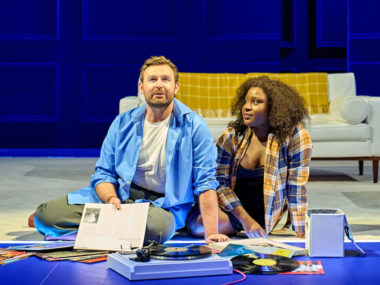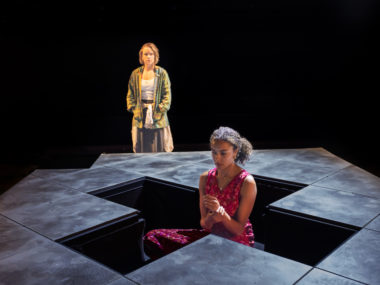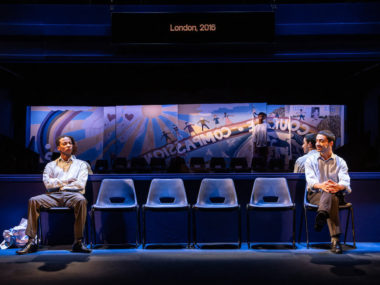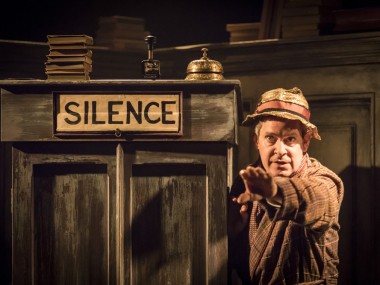The Real Thing, Old Vic
Tuesday 3rd September 2024
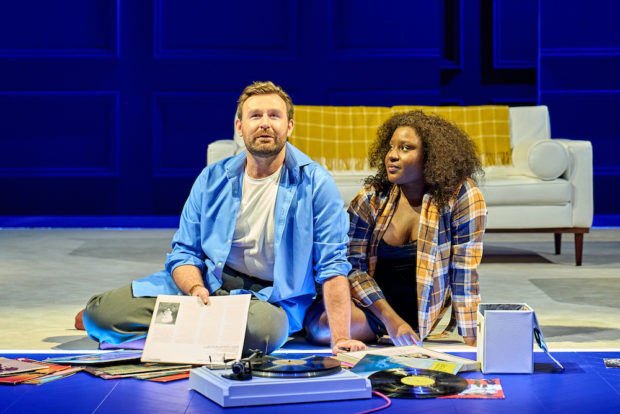
Adultery is the great staple of modern British playwriting. The anguish of marriage, and the temptations of infidelity run like a red thread from John Osborne’s fiery Look Back in Anger, via Harold Pinter’s aptly-named Betrayal, to more recent plays such as Nina Raine’s Consent and Danny Lee Wynter’s Black Superhero. At this point, readers are welcome to add their own examples. Whatever they are, one of the most frequently revived plays about love and marriage is Tom Stoppard’s passionate 1982 drama, The Real Thing, which now gets a visually beautiful and thoroughly engrossing production at the Old Vic.
Based vaguely on Stoppard’s own experience of having an affair with actor Felicity Kendal, the play is about Henry, an arty Stoppardesque playwright who betrays his wife, Charlotte, by having an affair with Annie, the spouse of his friend Max. Both the women are actors, and Annie is also a political activist. When she meets Brodie, a Scottish soldier who has been locked up after having gone AWOL, joining an anti-war demo, and burning a wreath at the Cenotaph. While in prison, Brodie writes a political play, but when Annie asks Henry to help get this produced, his reaction is scornful. Still, Annie has a mind, and emotions, that he cannot control.
Stoppard explores two big themes: one is about what it is to love, asking the question of how we can ever really know that what we are feeling is the “real thing”, and whether our partner feels exactly the same? But although the middle-class Henry, who gets all the best lines, is very eloquent, verbose even, when expressing his ideas about love, there’s also a very distinct uncertainty in his language, an ambiguity as this word smith — like Stoppard himself — struggles to put into words, to pin down, a condition, being in love, which many others have expressed much more directly. So it’s easy to empathize with both Charlotte and Annie, who are much more down-to-earth.
As well as being about how Henry talks about love, this is crucially a play about playwriting, with a play-within-a-play opener and references to Othello, Strindberg’s Miss Julie as well as to script writing for TV and film. Henry evidently likes complicated dramas full of fine subtle language, while Brodie writes clumsy, preachy, politically naïve work. So Henry’s dissection of a scene from Brodie’s play about how he met Annie is both funny and excruciating; it is powerful in its truth and its cruelty. At the same time, Henry is trying to put together his list of records for his appearance on Radio 4’s Desert Island Discs, but is trying to disguise his love for pop songs by including as much classical music as possible. Yet, despite the arguments of both Charlotte and Annie, he really does prefer Herman’s Hermits and The Righteous Brothers to Verdi and Puccini.
While Stoppard’s passion for pop music and for words comes across with enormous wit and energy, with several strong images, including the metaphor of good writing being like a well-crafted and well-seasoned cricket bat, which sends words into the air for a six, while bad writing is a lump of wood which is both useless in a game and hurtful on the fingers. His attack on poor political playwriting is partly a response to the sneers his previous work attracted from left-wing critics in the 1970s, and partly a plea for a higher quality of critique and engagement — after all, he was friend of Vaclav Havel and a supporter of Charter 77 activism against Communist oppression in Czechoslovakia (explored of course in his Rock ’n’ Roll).
In a subplot, Annie travels to Edinburgh to play Arabella in John Ford’s ’Tis Pity She’s a Whore, meeting Billy, a younger actor who is attracted to her. In a brief episode in which they rehearse one of their scenes from the play, the poetic richness of the erotic language of Jacobean theatre is implicitly contrasted with the more puzzling difficulties of writing about desire in the modern world. In the past, florid imagery could express the inexpressible while in the present Henry’s simple thought that love is about “knowing and being known” requires a page of monologue that complicates this feeling.
Stoppard’s Henry is deliberately made to be an over-thinker, a bit of a snob, and a bore who likes to talk over and correct the words of Annie, Charlotte, and of their teenage daughter Debbie, whose attitude to love and sex offers a youthful corrective full of clarity. Yet — despite the inevitably dated quality of some of the references and attitudes — Henry does get a lot of audience sympathy, especially as played by the ever personable James McArdle, who has excellent comic timing, lots of onstage charisma and moments of vulnerability, uncertainty and anguish. Placed centre stage, and given some cracking lines, he holds our attention.
Max Webster’s production, beautifully designed by Peter McKintosh, is delightfully contemporary in its meta-theatrical use of a stage crew that dances, occasionally with wonderful joy, during scene changes which use pop music from the Crystals’ “Da Doo Ron Ron” to Procol Harum’s “A Whiter Shade of Pale” and The Monkees’ “I’m a Believer”. If McArdle effortlessly dominates the stage action, I am less convinced by Susan Wokoma’s Charlotte or Bel Powley’s Annie, but perhaps that’s because both are a bit underwritten. There’s good support from Oliver Johnstone (Max), Karise Yansen (Debbie) and, making his stage debut, Jack Ambrose (Brodie). Rilwan Abiola Owokoniran gives Billy a great energy. A spirited and highly enjoyable revival.
This review first appeared on The Theatre Times

